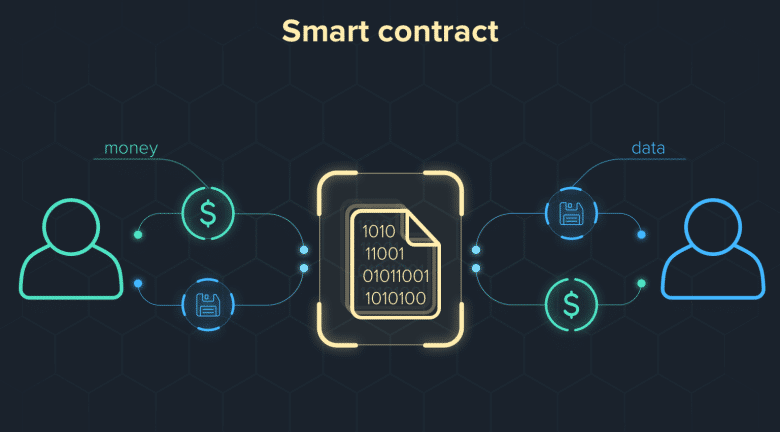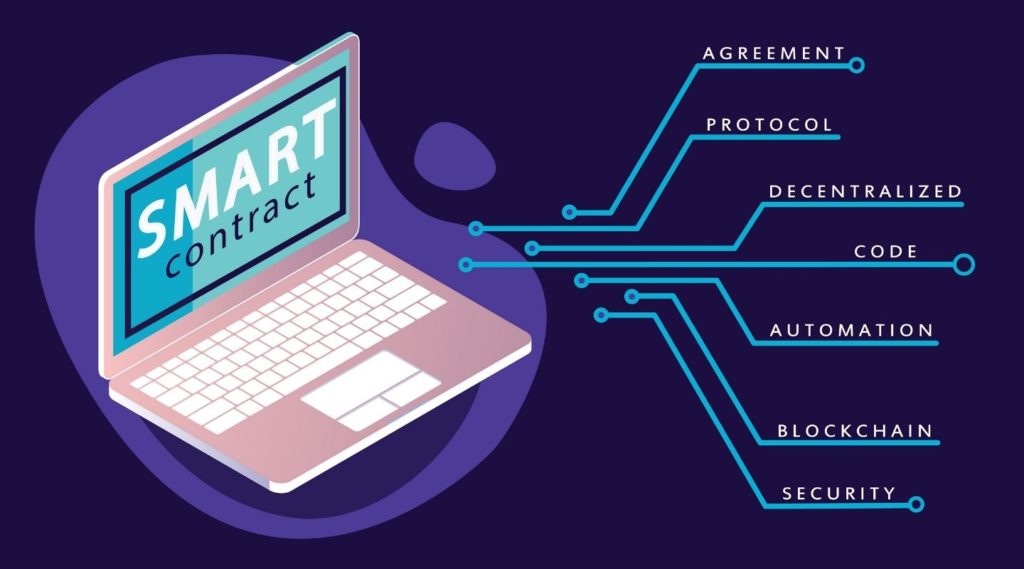Smart contracts are an integral part of the world of blockchain technology. These contracts are software programs that execute certain tasks between two or more parties when the stipulated conditions have been met. In essence, it is like a regular contract that self-executes and does not require an intermediary, as it relies on its programmed values.
 inn4science.com
inn4science.comThese contracts run on blockchain technology, the underlying technology of Bitcoin and most cryptos. The input information represents the values assigned by the developers, and when these values are met, the contract executes itself based on the rules it was programmed to do.
Smart contracts are the equivalent of an Application Programming Interface (API), but instead of being used on a usual web platform, it is applied on a blockchain. An Application Programming Interface (API) allows users to interact and introduce certain features on the platform they are working with.
What Smart Contracts Do
The smart contract allows the front-end user of a decentralized application (dApp) to access certain information of a decentralized blockchain database. One dApp can have multiple smart contracts that can complete different functions when they interact with the blockchain.
Smart contracts can also be programmed to execute tasks beyond crypto transactions and can be used to perform functions in a variety of industries, such as legal, insurance, real estate, and much more.
The History of Smart Contracts
 bitbay.marke
bitbay.markeNick Szabo, credited for putting the bases of cryptocurrency, was the first to propose the concept of smart contracts in 1994. When the concept first came out, there were no platforms that could support smart contracts, so obviously, there was no interest in them.
In 2008, the first crypto coin ever was created – Bitcoin – and, along with it – blockchain technology. This new technology provided the right environment for smart contract code development.
At first, blockchain was mostly used for making transactions and creating new coins, but when Ethereum appeared onto the scene, this all changed. Ethereum was the first blockchain platform to develop code specially made for dApp development.
This was the game-changer that prompted the apparition of many other platforms, such as NEO and EOS. The growing popularity of blockchain technologies also attracted attention to smart contracts and their possible use cases, which, in turn, resulted in an expansion in dApp-based blockchains.
Dapps for gaming and gambling have seen a rise in recent years on platforms such as TRON and Ethereum. The Cardano platform is also working towards implementing smart contract functionality with the Goguen update this year.
NEM, Stellar, Waves, and Tezos are also popular blockchain projects that allow the creation and deployment of smart contracts.
Smart Contract Applications and Blockchain
Blockchain is the perfect environment for smart contracts, as all the data stored is immutable and secure. The data of a smart contract is encrypted and can exist on a public or private ledger, meaning that the information recorded in the blocks can never be lost, modified, or deleted.
Blockchain integration into smart contracts gives developers more flexibility, as they are not limited to only one type of data. Developers are also able to implement a diversified array of transaction options during smart contract deployment.
 produclic.fr
produclic.frSmart Contract: The Inner Workings
Interdependence
A smart contract can work by itself, or it can be deployed simultaneously with other smart contracts. Contracts can also be programmed to execute in a certain order based on the performance of other contracts. For example, a smart contract can be set to start only when another smart contract has successfully completed its execution.
Smart contracts can, in theory, be used to entirely monitor and manage systems and organizations. This type of system has been implemented to some extent in various cryptocurrencies, in which the governing conditions of the network are pre-defined, thus enabling the platform to autonomously and independently governate itself.
Smart Contract Objects
Every smart contract consists of three integral parts, which are also known as objects:
- The first object is called signatories, the two or more parties that use the smart contract; they give their consent or disagreement regarding the proposed terms via digital signatures;
- The second object represents the agreement’s subject. The existence of this object is limited only within the smart contract’s environment. Otherwise, the smart contracts would have to be able to freely access the object;
- The third object of the smart contract is specific terms. Based on these terms, the contract will execute itself. They have to be described in detailed mathematical terms and implemented in a programming language that is compatible with the smart contract’s blockchain.
Environment
To be able to exist, smart contracts are required to have a specific suitable environment in which they can operate. The first criterion of the environment is to support the use of public-key cryptography, which enables the signing off of transactions via the cryptographic codes that are uniquely generated for each user. This is the system which is used when accessing crypto funds from a wallet.
The second condition that has to be fulfilled is to have an open and decentralized database, to which all contract parties have access. The database has to be trustworthy and fully automated.
Lastly, the smart contract’s inputted digital data has to come from a completely reliable source. This involves employing root SSL security certificates, HTTPS, and various protocols for secure connectivity.
Smart Contract Coding
Solidity is a programming language on which a smart contract is based and the native programming language of Ethereum, created in 2015. It has a syntax that bears similarities to that of JavaScript, and it was specially created to compile code for the Ethereum Virtual Machine.
The most convenient tool for smart contract development is considered to be Remix, an online IDE. You just copy the source code and paste it into Remix, and the code should automatically be compiled.
The Advantages of Smart Contracts
 cryptoast.fr
cryptoast.frSmart contracts provide their parties with a degree of trust and act as a neutral party when the deal is signed. Also, as the process is automated, the parties involved will not be required to travel and participate in person. People from two different places in the world can easily settle transactions without ever meeting face-to-face. This saves time and money for everyone.
By being encrypted and distributed among nodes, the smart contract will not be lost or changed without permission. Another benefit is that most intermediaries are removed from the process, with only the developer making the contract being the only person necessary.
Security features can also be integrated into a smart contract to automatically generate backups and duplicates in the event of damages or data losses to the original one. Cryptography is the technology used to secure the documents. Hackers would have to dedicate a huge amount of time, effort, and money to infiltrate and compromise them.
Smart contracts also increase speed and efficiencies as there is no more manual processing of paperwork involved.
The Disadvantages of Smart Contracts
However, smart contracts come with some disadvantages. The novelty of this technology can make consumers be quite wary of it, as they do not understand it yet.
Smart contracts are codes, and these codes are written by people. As such, there is a high chance of a smart contract code having many bugs because of human errors. Contrary to popular belief, coders are humans too, and they also make mistakes. Some mistakes, unfortunately, were very costly (see the DAO incident).
If the data is already recorded on the blockchain, it is very hard to make adjustments. This may, in turn, lead to more system errors and weakened security.
Another problem is that smart contracts lack a clear legal status. Currently, there is no official government regulation that applies to them.
A lot of engineering expertise is required to make perfectly operational smart contracts. Experienced coders that fail-proof smart contracts and implement them in existing technology and processes are hard to find; and costly.
Even if you are a decent programmer, you cannot just make your own smart contract and use it for a real-estate deal. You would still need to consult an IT specialist at some point to verify the accuracy of your code.
Final Thoughts
The potential of smart contracts is limitless, and they can actually change the way we make agreements across various industries. But we cannot implement this technology en-masse, as more experimentation is needed at this point. Bugs are a common issue with these contracts, which can lead to the demise of the entire system it runs on. A real-life example is the DAO hack in which funds siphoned through a code error in the smart contract in which the money was stored.
At the moment, smart contracts are still a technology in its early stages and will require more development to be used in more advanced future implementations.
Note: This post was originally published on 10 April 2019 and has been totally updated for the completeness and veracity of the content on 7 April 2020.
Source From : Coindoo News